'Everybody Has a Story' Photographic Exhibition Opens in Split to Celebrate Local and Expat Women
June 8, 2022 - Everybody has a Story is a photographic exhibition showcasing 36 photographs of women from all walks of life in Croatia, created during a 12-month period between 2021 and 2022. The photos present the female body in "All Her Glory”, and open up the discourse about the stories our bodies hold.
Everybody has a Story is a conceptual project by occasional TCN contributor Tash Peričić, in collaboration with Split photographer Antea Mrčela-Ljubić.
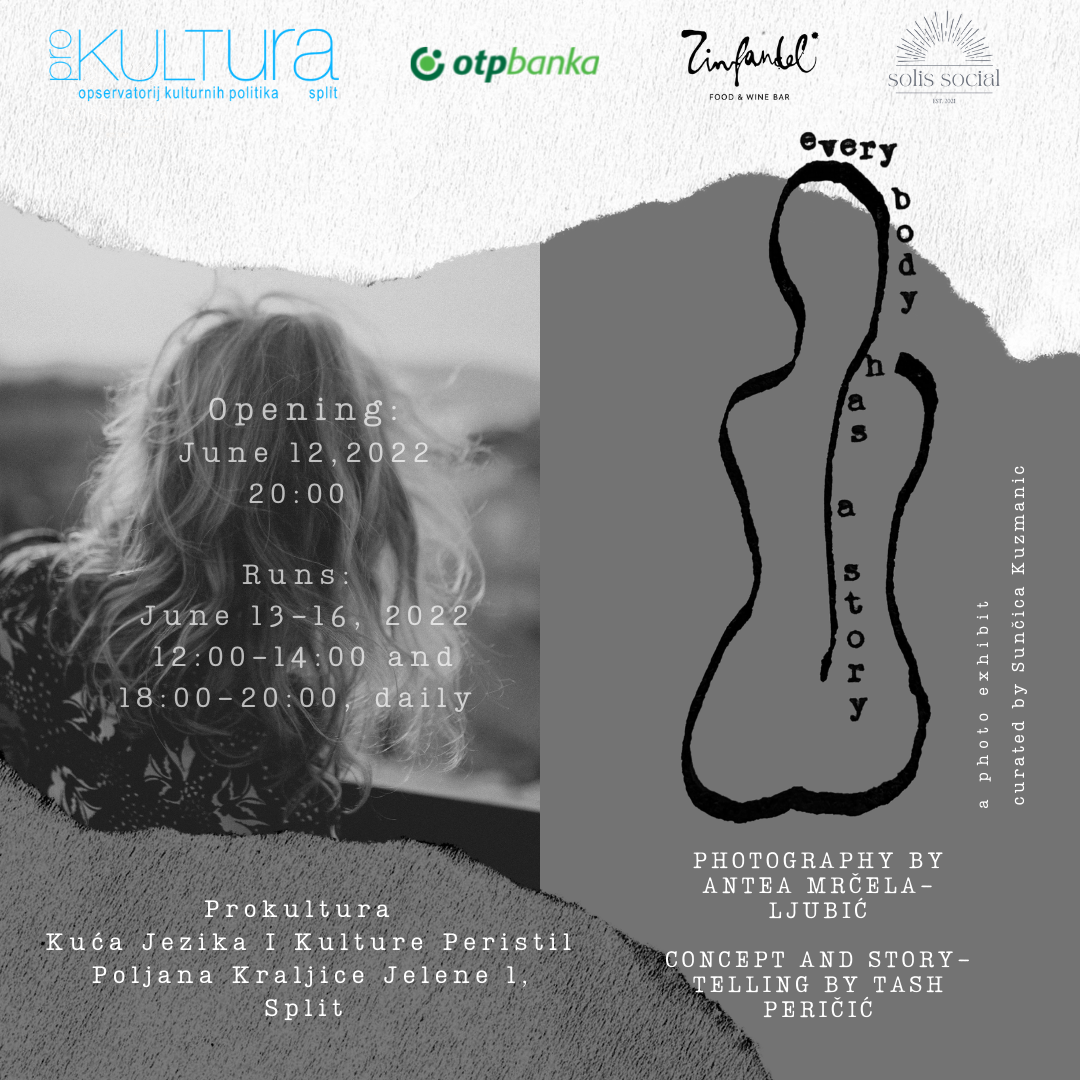
This exhibition is the realisation of Tash’s long-held dream. Her love of storytelling, sisterhood, and community brought the project to life. Tash grew up in New Zealand and was raised in a Māori community where the importance of community, song, storytelling, and traditional rituals live on. Though it may have been unconscious, the cultural roots certainly influenced the writer in conceiving this multi-dimensional interactive project – which was designed to lift and empower the women who took part in the project. A lot happened behind the scenes to arrive at the photos displayed here.
The connection between Tash and the photographer Antea formed in a photoshoot in which Tash was the muse. Inspired by Antea’s natural grace and ability to make her feel comfortable, and the empowering feeling of the experience, a seed was planted in Tash’s heart, to create a project based around this concept, for other women – one day. And so, it happened. 5 years later, Tash and Antea reconnected and started this project which took on a life of its own. Antea’s gentle nature and attention to human emotion and intimate moments, made her the perfect photographer to realise this project.
Along with Antea and Tash, 10 women from 6 countries (all living in Croatia) aged 20 – 60 years, joined the project. For 12 months, through four seasons, they gathered to share their stories and have photoshoots with Antea. The women held space for each other to speak, they listened, and were themselves heard. They laughed and they cried together. The project which inspired the women to share, created a circle of women, which became a platform for sisterhood and friendship.
Each of these women had a photoshoot with Antea. Some photoshoots were individual, others were in a group environment – in all photoshoots, they were encouraged by their ‘sisters’. Supported and uninhibited, they felt safe to show their nature and spirit which was expertly captured by Antea’s eye. The photoshoots took place in every season of nature, and invariably capture the various ‘seasons’ of a woman’s life. The photos reveal the women and bodies as they are – perfect, unique, and beautiful. Stories written by the women in the photos open their intimate world to us and remind us that not all scars are visible. Words written by Tash invite us to pause and reflect.
The exhibition takes us beyond the skin and exterior of the body, it teaches us to not judge one another by appearance, but rather to come from a place of curiosity and inquiry, so we may know ourselves and others better. Creating compassion and understanding – something the world so desperately needs.
This exhibition honours all women, everywhere, and asks us to see beauty in others and ourselves. It also showcases the healing power of storytelling and sisterhood, and reveals something we often forget – that everybody has a story.
About the Creators
Antea Mrčela-Ljubić is a Split-based photographer who has been in the photography business for 10 years. As a sociologist, Antea’s main focus is human emotions and subtle moments between two or more people. This passion and attention to the subtleties of human nature naturally found its home and expressed itself in wedding photography. Her curiosity for observing people and their diversity led Antea to find a new field of interest – intimate portraits with the intention to help women acknowledge their worth and beauty. Because of standardised beauty frames, a lot of women doubt their authenticity, worth and beauty. This is the main drive for Antea’s work – to present women as they are, unique and beautiful. Antea encourages movement and creates a space where women feel safe to express themselves or just be. In this way, Antea’s photography captures depth and intimacy that few can.
Tash Peričić is from New Zealand; she has travelled around the world and moved to Split for love. As a writer, Tash has long shared personal and vulnerable stories, through this process she learned the healing power of storytelling and connection, and in recent years – the importance of community. Tash created the ‘Empowered Women, Empower Women’ group that can be found on Facebook. The idea behind this group was to create a space where women can connect with like-minded women, encourage, and support one another. Tash is inspired by human nature, psychology, indigenous wisdom, and spiritual teachings. Alongside writing, Tash works in the yachting industry as a freelance stewardess, educator, and consultant. In all she does, Tash aims to connect, uplift, or inspire others.
Curated by Sunčica Kuzmanić, Everybody has a Story opens on Sunday, June 12 at 8 pm. It will be on view daily, 12 – 2 pm 6 – 8 pm, from June 13 to 16, 2022, at the Prokultura Gallery, Peristil, – Poljana Kraljice Jelene 1, Split.
For more, make sure to check out our dedicated lifestyle section.
Foreigners Self-Isolating in Croatia: Do You Feel Safer? Tash from New Zealand
April 5, 2020 - Do foreigners in Croatia feel more or less safe sitting out COVID-19 here than in their home country, and what are their experiences? A new series on TCN, with Tash Pericic from New Zealand in Dugi Rat as our 27th contributor.
Oxford University recently published some research on government responses to coronavirus which showed that Croatia currently has the strictest measures in the world. While inconvenient, this is a good thing in terms of reducing the spread of the virus, and I am certainly not alone in my admiration of the official Croatian handling of this crisis in recent weeks, both in terms of action and communication.
But what do other expats here think? And how does it compare with the response in their home country? Would they rather sit this one out here or there? In the first of a new series on TCN, we will be featuring expats from all over the world to see what their views are on life in corona Croatia rather than back home. So far we have heard from expats in Croatia from Romania, USA, Ireland, UK, Mexico, Argentina, Spain, Singapore, Holland, Canada, India, Hong Kong, Venezuela, Latvia, China, Honduras, Hungary, Moldova and Germany. Next up, Tash Pericic from New Zealand in Dugi Rat.
If you would like to contribute to this series, full details are below. Now, over to Tash.
Firstly, how are you? Are you alone/with someone? Tell us a little about your situation and sanity levels.
I am doing ok, I am isolated with my husband and two fur babies in Dugi Rat, just outside of Split. Our circumstance is actually very surreal because we have been working in tourism (on yachts) for years and were in the process of trying to buy our own yacht but the deal fell through. At the end of last year, we signed an agreement to work as crew for a private owner (so, not reliant on tourism). We never could have predicted this pandemic but are obviously very fortunate. At the beginning, I actually felt guilty for being ok financially but then I realised guilt helps no one. We are thankful to be in a position where we can help others and feel even more driven to do so.
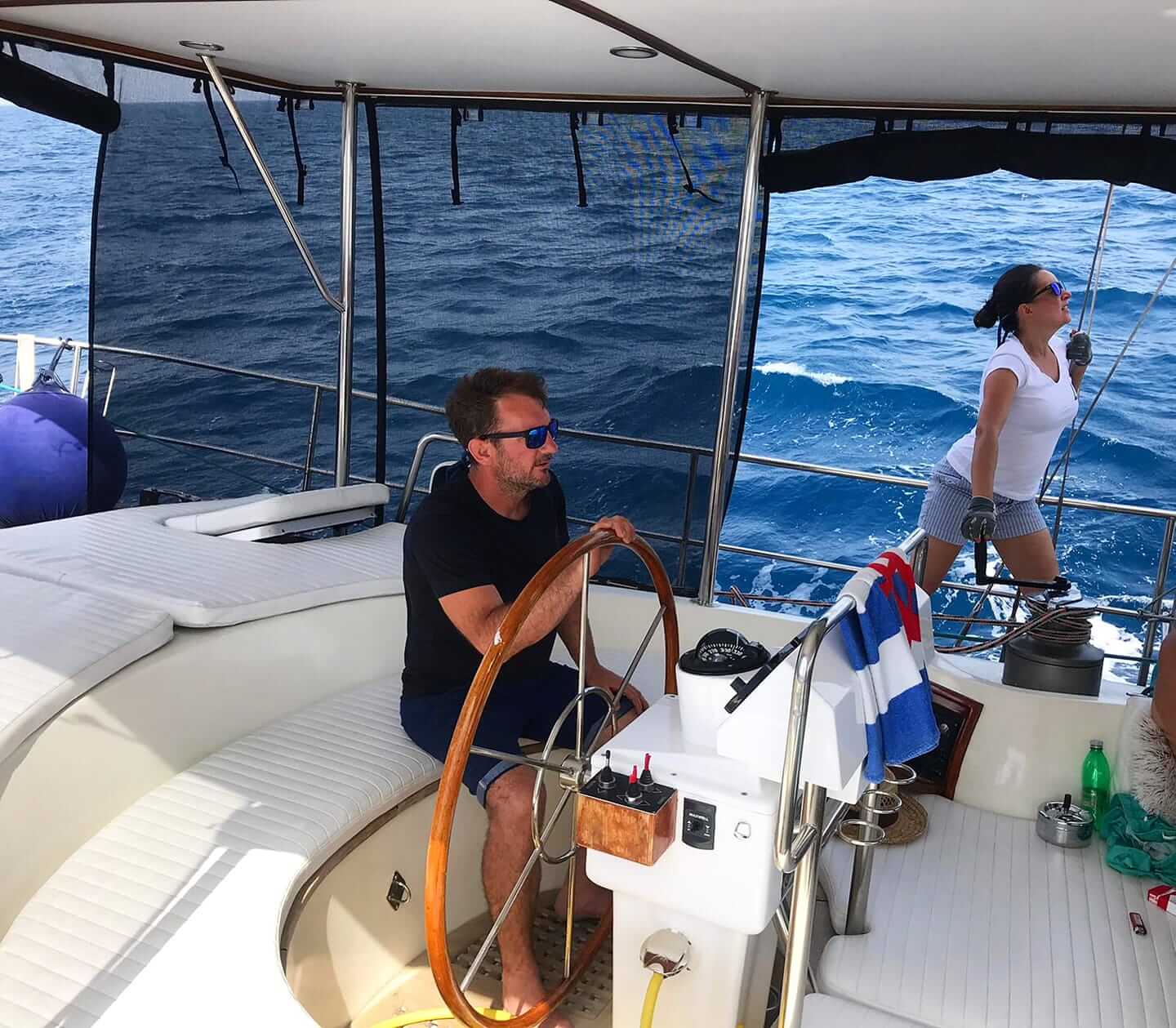
We should be sailing right now...
We have been in self-isolation for 3 weeks now and honestly, it has gone quite quickly. However, we can’t complain as our situation is different to many: we have our health, we don’t have kids, we own our apartment and our income isn’t affected (for now). I am not saying this to be a smug son of a b*tch, I am saying this to preface and explain that isolation for us, doesn’t come with most of the stresses many are facing; hence, we have the energy to try and use this time productively.
This means our sanity levels are also fine. While I am definitely a social person; we work seasonally, so every winter we typically ‘self-isolate’ for a period and are used to finding ways to keep ourselves occupied. Luckily, we have a small radionica (workshop) in our basement to keep my husband busy – building furniture is his side passion. For myself, I have my writing (I recently penned an article about hope in these times) and have just started Croatian lessons via Skype; so, this is more than enough to occupy my time.
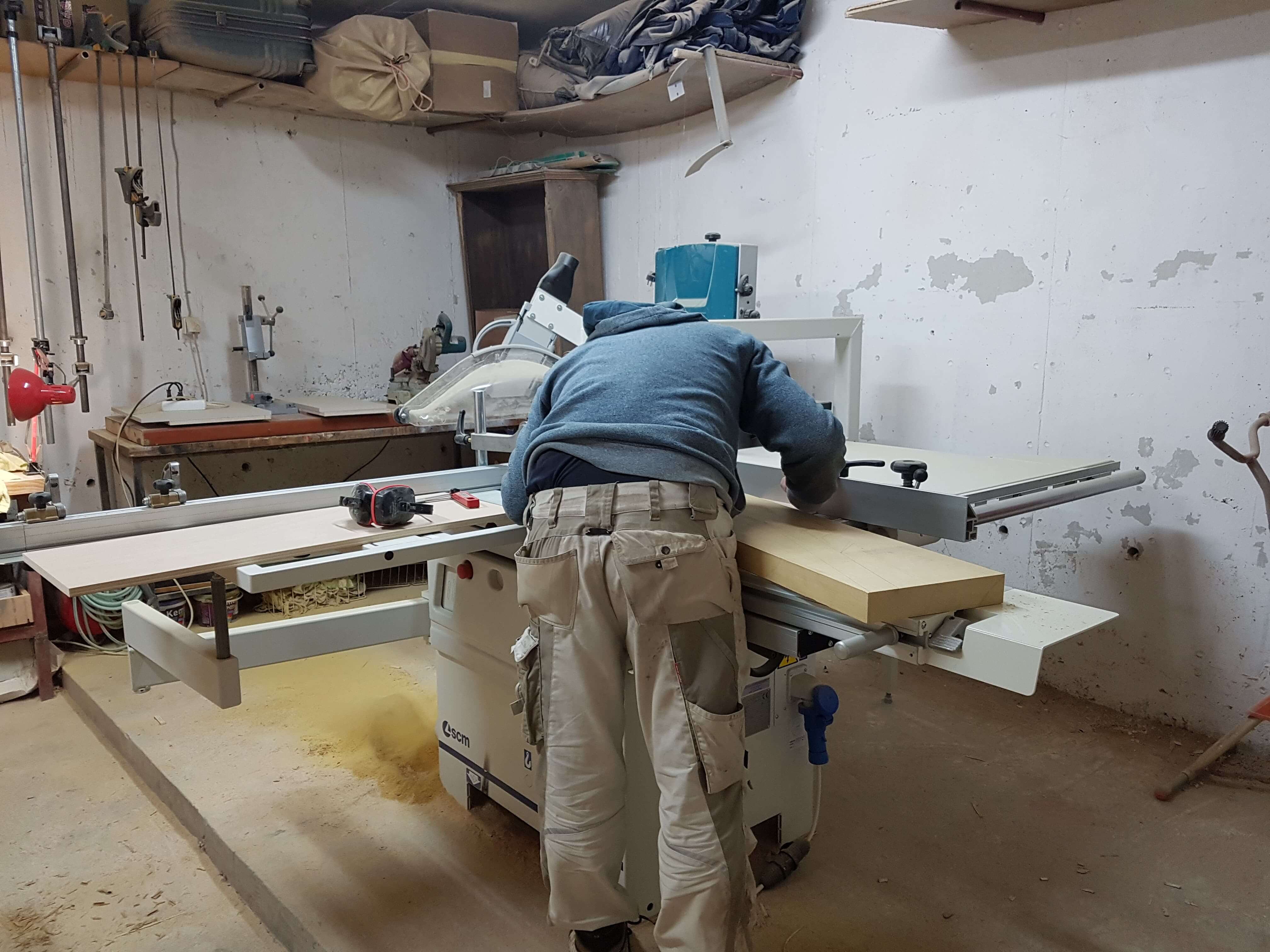
My husband keeping busy in his workshop
When did you realise that corona was going to be a big issue?
Like many, I think I honestly didn’t take it seriously until measures were announced to start closing borders and then came lockdown. It feels like it all happened so fast. Maybe it is a sign of our times that we are so desensitised to news but I feel that no one (or not many) comprehended and could have predicted the situation we are in. We’ve heard of the Spanish flu but this still feels unprecedented; not in my wildest dreams could I have imagined this, yet here we are.
What is your impression of the way Croatia is dealing with the crisis? How safe do you feel?
I am beyond impressed with how Croatia is handling this crisis. Honestly, I really didn’t expect such a response and I definitely didn’t expect people to take it so seriously. Yet, after the news was announced about being on lockdown, people were immediately off the streets where I live, the local playground was closed and covered, and social-distancing measures were put in place in the local supermarket, post office etc. While it all still feels a little eerie, I feel extremely safe living here in Croatia right now. Svaka čast Hrvatska!
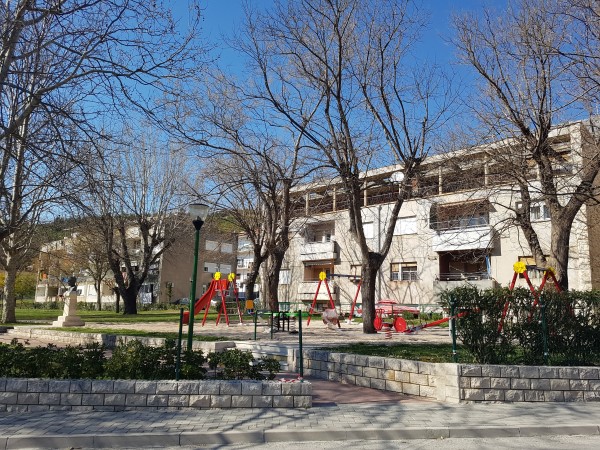
Our local park has been child-free since lockdown began
Now compare that to your home country and how they are handling it. What is Croatia doing better/worse?
I feel safe and happy to be living in Croatia; however, New Zealand is also handling it well. I think the Prime Minister, Jacinda Ardern, is one of the finest examples of leadership that we currently have in the world. Ardern’s communication is clear, concise and compassionate; they are also in lockdown, whereas their neighbour Australia is sending mixed messages and seems reluctant to take a strong stance one way or the other. I do have to boast, does anything really beat seeing the Prime Minister of a country doing live Q&A sessions on Facebook in comfy home clothes?
I can’t say that Croatia is handling things better or worse than New Zealand; I haven’t studied all communications and policies but from where I stand, both are doing an exceptional job at trying to flatten the curve, communicate clearly and take care of their citizens. I believe new economic measures are to be announced tomorrow in Croatia for ways the government plans on helping businesses. Considering a substantial chunk of Croatia’s GDP is reliant on tourism (around 20%), I am sure the Croatian government understands that it is in their best interest to protect their people and business owners; I am hoping for the best for all.
What about official communications from the authorities, compared to your home country?
Again, I think both countries are doing this well, there is clear information coming from both countries frequently and both seem to be using technology to their advantage – using all forms of media and social media to get their messages across. I watched TV for the first time yesterday and noticed that all of the ads are geared around staying inside and there is even a permanent watermark in the corner saying to stay home #ostanidoma. This blew me away. As a foreigner, I obviously can’t keep up with all of the Croatian news but thanks to TCN I feel informed. I also need to mention the articles by Igor Rudan which are some of the best articles I have read about Covid-19 and the situation we are in; these articles helped me comprehend the situation better – thank you Igor (and Lauren for translating)!
What's the one thing you wish you had taken with you into self-isolation?
Some resistance bands for training and a ukulele. The resistance bands explain themselves and I’ve always wanted to learn to play the ukulele. Mind you, writing and studying Croatian is keeping me busy enough, so it probably would have ended up on a shelf gathering dust like my guitar…
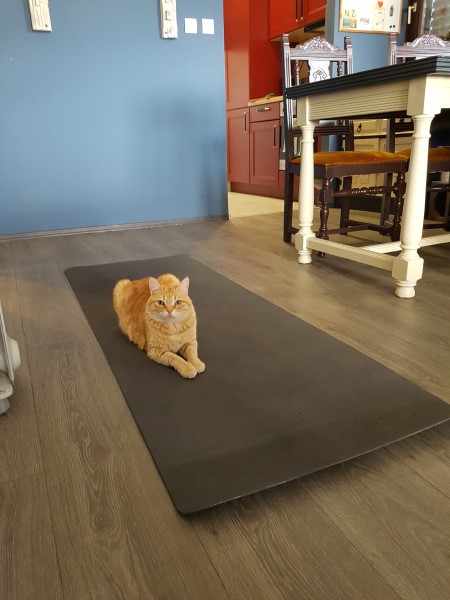
I'll settle for yoga with my fur babies.
One thing you have learned about yourself, and one thing you have learned about others during this crisis.
Big question, how long do you have? Seriously, I have learned a lot, this stillness is a great time to pause and reflect. I saw a post which read: “I feel like we’ve all just been put on the naughty step and been told to think about what we’ve done.” Which kinda sums it up; none of us would choose to be in this situation but now that we’re here, I believe we need to take the time to question our lives and values.
I have been doing a lot of digging into myself and questioning whether I am living out my values. While I feel ‘on track’ in a general sense, something that has come up for me is that I realised that I am still holding myself back in many ways. We all have that little voice that tries to keep us playing ‘small’ where it’s safe and I realised that I have been listening to it too often. One big positive that has come out of this for me is that I have glimpsed the absurdity of fear and self-doubt; considering everything can be taken away in the blink of an eye, protecting ourselves by playing small is ridiculous. And, considering everything going on in the world – does fear of what others think or self-doubt really have legs to stand on? For me, the answer is no.
What I have I learned about others during Crisis? I have learned that we all respond differently in crisis; it is even likely that we will flow between various stages during this period: disbelief, anger, frustration, helplessness, acceptance… In fact, it is very similar to the stages of grief. Perhaps it is a sort of grief we are experiencing, grieving over the world we have ‘lost’ and confused about how to begin again. This time will undoubtedly bring out the best and worst in people – I see initiatives to help community cropping up, just as I see actions of greed and selfishness (the whole toilet paper drama is a good example of this), I see kindness and support on social media, just as I see judgment and criticism. What stands out to me through all of this is that now more than ever, we need to practice compassion – compassion for ourselves and others. It is a strange time for all of us, so I am trying to be far kinder to myself and find compassion for others. If I see behaviour I don’t agree with, I have been reminding myself “maybe they aren’t their best right now, you don’t know what they’re struggling with” – ironically, isn’t this how we should always treat people?
This is what has been coming up for me, as you can see, with less stresses, my mind has switched to the philosophical element of it all.
Thanks, Tash, stay safe and see you on the other side.
TCN is starting a new feature series on foreign experiences of sitting out COVID-19 here in Croatia compared to their home country. If you would like to contribute, the questions are below. Please also include a para about yourself and where you are from, and a link to your website if you would like. Please also send 3-4 photos minimum to This email address is being protected from spambots. You need JavaScript enabled to view it. Subject Corona Foreigner
If you would be interested to record a video version for our partners www.rplus.video please let us know in the email. Thanks and stay safe.
Foreigners Self-Isolating in Croatia: Do You Feel Safer Than in Your Home Country?
Firstly, how are you? Are you alone/with someone? Tell us a little about your situation and sanity levels.
What do you think about the economic measures the government is taking, are they helping your business? (PLEASE IGNORE IF THIS DOES NOT AFFECT YOU)
When did you realise that corona was going to be a big issue?
What is your impression of the way Croatia is dealing with the crisis? How safe do you feel?
Now compare that to your home country and how they are handling it. What is Croatia doing better/worse?
What about official communications from the authorities, compared to your home country?
What's the one thing you wish you had taken with you into self-isolation.
One thing you have learned about yourself, and one thing you have learned about others during this crisis.
TCN has recently become a partner in Robert Tomic Zuber's new R+ video channel, initially telling stories about corona experiences. You can see the first TCN contribution from this morning, my video from Jelsa talking about the realities of running a news portal in the corona era below. If you would like to also submit a video interview, please find Robert's guidelines below
VIDEO RECORDING GUIDE
The video footage should be recorded so that the cell phone is turned horizontally (landscape mode).
There are several rules for television and video news:- length is not a virtue- a picture speaks more than a thousand words
In short, this would mean that your story should not last more than 90 seconds and that everything you say in the report should be shown by video (for example, if you talk about empty streets, we should see those empty streets, etc.).
How to do it with your cell phone? First, use a selfie camera to record yourself telling your story for about a minute and a half. Ideally, it would be taken in the exterior, except in situations where you are reporting on things in the interior (quarantine, hospital, self-isolation, etc.). Also, when shooting, move freely, make sure everything is not static.
After you have recorded your report, you should capture footage that will tell your story with a picture, such as an earlier example with empty streets.
One of the basic rules of TV journalism is that the story is told in the same way as a journalist with his text. Therefore, we ask you for additional effort. Because we work in a very specific situation, sometimes you may not be able to capture footage for each sentence of the report. In this case, record the details on the streets: people walking, the main features of the city where you live, inscriptions on the windows related to the virus, etc.
The same rules apply if you are shooting a story from your apartment, self-isolation, quarantine. We also need you to capture footage that describes your story.
When shooting frames to cover your reports, it is important that you change the angle of the shot (in other words, shoot that empty street from several angles). Also, when shooting a detail, count at least five seconds before removing the camera to another detail.
The material should be about 5 minutes long (90 seconds of your report + frames to cover your story).
After recording everything, send us to Zagreb, preferably via WeTransfer to This email address is being protected from spambots. You need JavaScript enabled to view it.
You can find more musings from Tash on her website or Instagram.
'Insider' Meets New Total Croatia Sailing Editor Tash Pericic
Total Croatia Sailing goes live next week. Ahead of the launch, editor Tash Pericic is featured in popular portal Insider on May 24, 2017.


